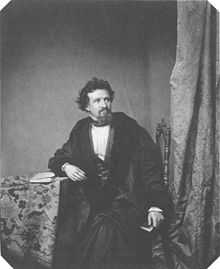Hermann Lingg

Hermann (Ritter von) Lingg (22 January 1820 – 18 June 1905) was a German poet who also wrote plays and short stories. His cousin, Maximilian von Lingg, was Bishop of Augsburg.
He was born in Lindau. Lingg studied medicine at the universities of Munich, Freiburg, Berlin, and Prague, and became a doctor in the Bavarian Army. From 1839, he was a member of the Corps Suevia München.[1] His battalion was used to quell revolutionary uprisings in Baden; forced to act against his convictions, he fell into severe depression, entered a mental hospital in 1851 and soon submitted his resignation. From that point on, he lived in Munich and devoted himself to historical and poetic studies, financially supported by King Maximilian II. His marriage to a forester's daughter in 1854 improved his mental stability, and a pension (with occasional financial support from friends, such as Max von Pettenkofer and Justus von Liebig, and the German Schiller Foundation) improved their living standards.
Lingg first gained attention with a collection of poems introduced by Emanuel Geibel (Stuttgart 1853). His most famous work is Die Völkerwanderung ("The Great Migration", Stuttgart, 1866–68, 3 vols). He was ennobled in 1890.
His manuscripts are now located in the Bavarian State Library. There are streets named after him in both Munich and Lindau.
Works
- Catilina, 1864
- Die Walküren, 1865
- Vaterländische Balladen und Gesänge, 1868
- Liebesblüten aus Deutschlands Dichterhain, lyrical collection, 1869
- Gedichte, 3rd book, 1870
- Zeitgedichte, 1870
- Wanderungen durch die internationale Kunstausstellung in München, 1870
- Violante, tragedy, 1871
- Dunkle Gewalten, epic poetry, 1872
- Die Besiegung der Cholera, play, 1873
- Der Doge Candiano, 1873
- Berthold Schwarz, 1874
- Die Sizilianische Vesper, 1876
- Macalda, tragedy, 1877
- Schlusssteine, poems, 1878
- Byzantinische Novellen, stories, 1881
- Von Wald und See, stories, 1883
- Clytia. Eine Szene aus Pompeji, 1883
- Skaldenklänge, collection of ballads by contemporary poets (with Gräfin Ballestrem), 1883
- Högnis letzte Heerfahrt. Nordische Szene, 1884
- Lyrisches, poems, 1885
- Die Bregenzer Klause, 1887
- Meine Lebensreise, autobiography, 1899
Bibliography
- Emil Pfaff: Hermann Lingg als epischer Dichter. Ebering, Berlin 1925.
- Frieda Port: Hermann Lingg. Eine Lebensgeschichte. Beck, München 1912.
- Walter Knote: Hermann Lingg und seine lyrische Dichtung. Mayr, Würzburg 1936.
- Arnulf Sonntag: Hermann Lingg als Lyriker. Lindauer, München 1908.
- Manfred Zschiesche: Hermann Lingg. Eine Erscheing des deutschen Spätklassizismus. Mit besonderer Berücksichtigung seiner Dramen. Korn, Breslau 1940.
References
- ↑ Kösener Korps-Listen 1910, 178, 247
External links
- Literature by and about Hermann Lingg in the German National Library catalogue
- Works by Hermann Lingg at Zeno.org (German)
- Works by Hermann Lingg at Projekt Gutenberg-DE (German)
- Transkriptionen bei ngiyaw eBooks - sowie Digitalisate bei ngiyaw Sources
- "Über moderne Lyrik" von Hermann Lingg im Projekt "Lyriktheorie"
- Paul Heyse: Autobiographisches, Jugenderinnerungen und Bekenntnisse, 5. König Max und das alte München, Das Krokodil